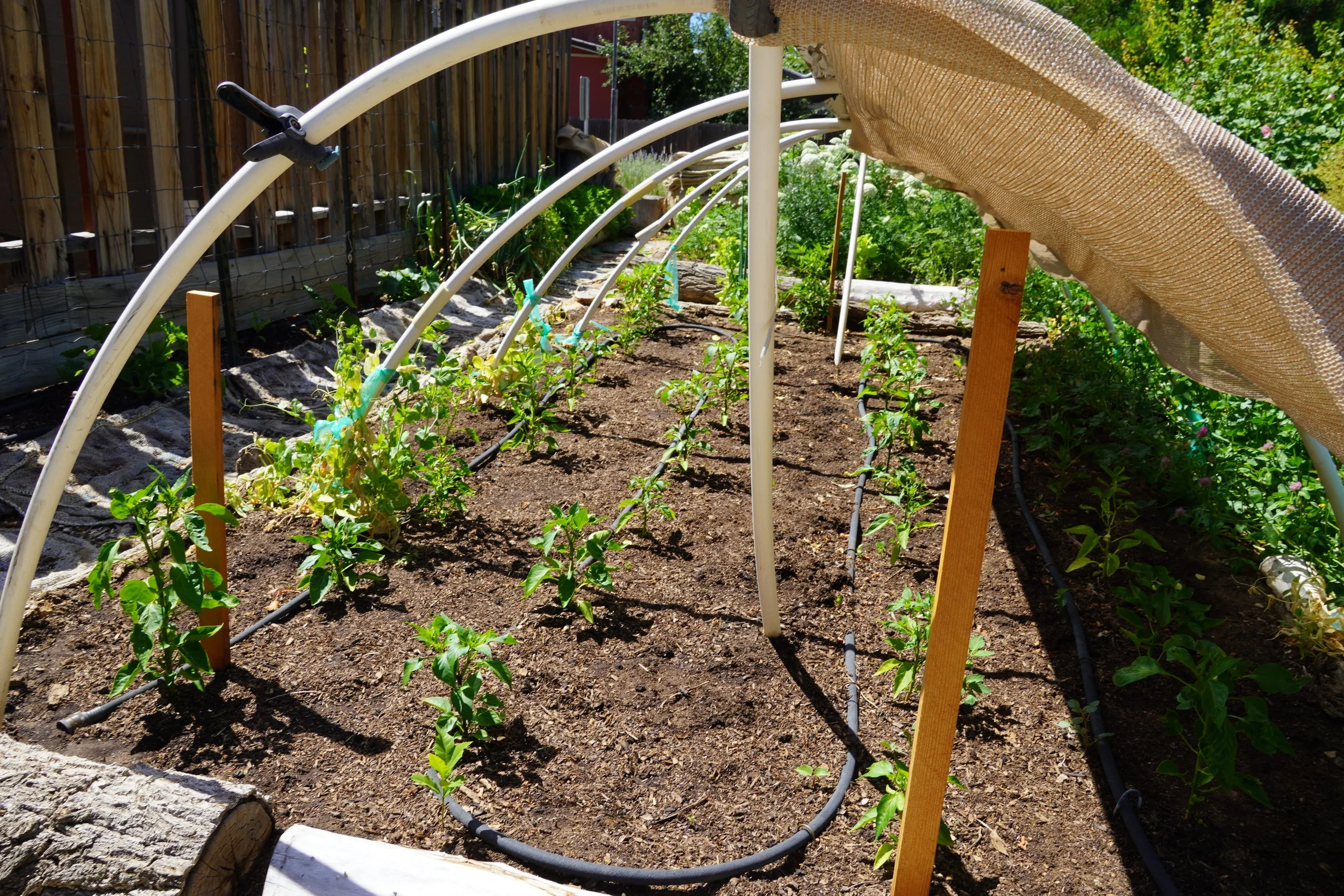Mark Hebert is hard at work under a morning Reno summer sun at the front of the Stump Tree Urban Farm making compost with donated coffee grounds and chaff in the middle of Midtown.
“It's like clay, but it's not clay, it's worm poop. And this is like the best nutrient in the world for your plants,” he says of his composting results. “Great place to get rid of kitchen scraps and a lot of other organic matter. And then I got some old sleeping bags and put them in free plastic bags I get. And I use that as an insulating layer to keep it from getting too hot. And then when I'm done, I cover the whole thing with burlap. That's it.”
Hebert, 75, now prefers to keep his face out of photos, wanting the focus to be on the 40-foot-by-80-foot teeming frontyard ecosystem of tomatoes, pumpkins, garlic, arugula, sweet white onions, potatoes, strawberries, sunflowers, peppers, Japanese lettuce, basil, cilantro, carrots, bees, a crimson clover meadow, creeping thyme, cucumbers, an odorous and contained mint garden and an aquaponics and bee watering station.
Hebert was a construction laborer for 40 years who retired at 58, got divorced at 64 and then started getting into gardening with a ring of onions and a couple tomato plants. “One of the cliches I've come up with is if it wasn't for this garden, I'd be completely crazy. And because of this garden, I'm only half crazy,” he says.
“I am not a scientific gardener. I'm an emotional gardener. And I know that's a tomato plant, but I have no idea what kind,” he says while giving an extended tour.
He can occasionally get precise though.”This is what they call walking onions, Egyptian walking onions and that’s the bulb. When the bulb falls over on the ground, it sends down roots and they kind of walk across the property that way. This is what I call my mother plant. Anything that grows, I'm happy with it and I can selectively prune it and weeded out if I need to.”
Hebert made his own rainwater capture system and a watering line with an old ski sock tied to the end. “You can buy a pretty aluminum thing for about 12 bucks, but I only had one of these ski socks, so I put it to use,” he explained.
He has no irrigation system though, and hand waters everything twice a day, throughout the year.
“In the winter, there's not much growing. However, the worms and the mycelium and all those microbes, they need water to be healthy,” he says.
He is also working on a circuitous forest pathway with flat logs that came from trees on the property that he cut down. “I’m not an English gardener. I do not want straight borders. It’s all designed to rot. All this stuff is and is rotting as we speak.”
Hebert sold this property on Caliente street to a friend not wanting to be a homeowner and stayed on as a renter gardener. “It was a business deal eight years ago. I just decided I didn't want to be a property owner. I don't want to be part of that system. So we made a deal. I sold him a house under market value and he promised me cheap rent for the rest of my life,” he says.
He trades some of his produce for meals at local restaurants. “I’m a bachelor who doesn't cook, so I this works for me quite well,” he says. He also provides ingredients for a local group which cooks healthy meals for the unhoused.
Pedestrians sometimes stop to chat, while he cut down a six foot fence into his neighbor’s property in half.
“I've handled a lot of food over this half fence, and had there been a six foot fence there, it probably wouldn't happen,” he said.
“If I'm known as the old man down the street who had a great garden, I'm okay with that. But it's the soil that actually let that happen. So the legacy that I'd like to leave is this garden to somebody else who'd like to carry it forward. I'm also going to be composted when I die. And I'd be perfectly okay with being mixed right back into the garden. I don't know the legality of that, but I'd be nutritious, I'm sure,” he concluded, before handing over a bag of fresh and wonderfully flavored produce to go.





